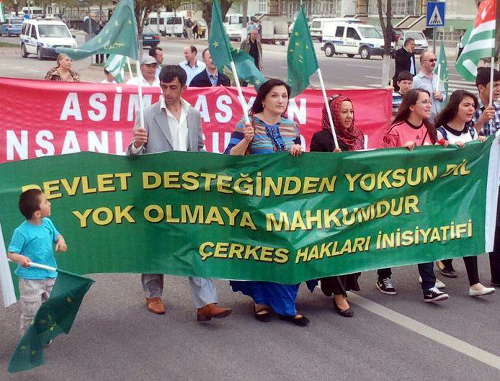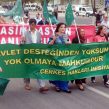
Circassian Activism Encompasses More Countries as the Opportunities for Interaction Expand
Publication: Eurasia Daily Monitor Volume: 9 Issue: 91
By:

On May 4, 17 Circassians from Syria arrived at the Mineralnye Vody airport, situated in the south of Stavropol region. Fourteen of the new repatriates moved to Kabardino-Balkaria and three to Adygea. About 100 repatriates from Syria have resettled in the North Caucasus after the crisis in Syria began, according to a local activist Beslan Khagazheev of the Circassian organization Peryt. “We send out official invitations that enable the repatriates to receive Russian visas. Then we help them to receive the necessary documents and find accommodation,” Khagazheev told Caucasian Knot news agency. According to the Circassian activist, local businessmen pay for the housing of 60 repatriates who live at a hotel and the rest live at their relatives’ homes. Although questions about government financing of the program for the Circassians’ repatriation from Syria were raised by the Circassian activists at the end of 2011, it was still unclear whether government funds will be used to help the Circassians, who are fleeing violence in Syria (https://kabardino-balkaria.kavkaz-uzel.ru/articles/206185/, May 4).
Earlier in March 2012, an official delegation of Russia’s Council of the Federation visited Syria to assess the migration situation among the Syrian Circassians whose full numbers in this Arab country are estimated at up to 100,000 people. According to Albert Kazharov, Kabardino-Balkaria’s representative in the Council of the Federation, over 200 Syrian Circassian families expressed their wish to resettle in the North Caucasus. The figure for the actual repatriates may be much higher. As Kazharov pointed out, the delegation visited one of the suburbs of Damascus where 8,000 Circassians lived, and none of the Circassians they had encountered ruled out the possibility of emigrating to the Russian North Caucasus. Much will depend on the further developments in Syria, according to Kazharov (https://www.kavkaz-uzel.ru/articles/203741/, March 26). Peryt has reportedly sent out over 600 invitations, and many of the Syrian Circassians are expected to arrive in the North Caucasus over the summer (https://fond-adygi.ru/page/vozvrashhenie-na-rodinu, May 6).
Circassians were resettled in Syria by the Ottoman Empire after the Russian Empire advanced to take over the North Caucasus in the 19th century. The Tsar’s forces killed and expelled most of the Circassian population from the North Caucasus and, especially, from the Black Sea coast, leaving only a fraction of them in their homeland. For a long time, Circassians in the North Caucasus and in other countries were unable to have contacts with each other, but with the demise of the USSR and the advent of modern communication technology, their interaction became much easier. Now, the Circassian activists display increasingly greater propensity to organize for collective action. Opposition to the Winter Olympics in Sochi in 2014 has become the focal point of Circassian political activism. The Circassian activists try to use this opportunity to attract the world’s attention to their problems. They assert that the land of, which was populated by the Circassians before the Russians’ conquest, is a “genocide land” and therefore cannot be used to host the Olympics. Some Circassian loyalists in the North Caucasus support the Sochi Olympics, even though the Circassian history of the area was entirely erased from preparations for the Olympics, which are being rendered as a purely “Russian” event. On June 18, another “Circassian day” will be held at the European Parliament in Brussels, during which time the Circassian activists will raise the issues of the Olympics in Sochi and the Russians’ 19th century expulsions of Circassians and other North Caucasians (https://www.aheku.org/page-id-2991.html, May 8).
Unlike the Sochi Olympics, the Syrian Circassians question is a relatively non-contentious issue on which all Circassian activists and even Moscow agree, at least formally. Moscow’s interest is, of course, to use the Syrian Circassian issue to dampen the Circassians’ criticism but at the same time to avoid any significant number of Syrian Circassians coming to the North Caucasus.
In the meantime, the Circassians’ example inspired the ethnic Abkhaz that also live in Syria to emigrate to Abkhazia. On May 4, 27 Abkhazians from Syria arrived in Abkhazia via Sochi; another five Abkhazians arrived in Abkhazia earlier. It appears the number of Abkhazians in Syria is relatively low (https://www.kavkaz-uzel.ru/articles/206154/, May 6). Expulsion of Abkhazians from Abkhazia was part of the same process, launched by the Russian Empire during the conquest of the Caucasus. In the contemporary political setting, however, Abkhazia officially endorses the Sochi Olympics, since this Georgian breakaway territory heavily depends on Russia for its security and economic prosperity. Circassian activists, some of who fought on the Abkhaz side in the Georgian-Abkhaz war of 1992-1993, have scathingly criticized the Abkhaz for their complacency with Russia.
Circassian activism started to have some reverberations not only in the North Caucasus, but also in Turkey, where the Circassians’ concentration is perhaps the highest in the world. According to a Caucasian Knot report, on April 29, a protest rally occurred in the large industrial city of Kayseri in central Anatolia. Circassian protesters demanded that the Turkish authorities provide opportunities for Circassian language study in schools and broadcast in Circassian on the state-run TV channels. The organization Circassian Initiative, which was founded two years ago, ran the rally. Valery Khatazhukov, a human rights activist from Nalchik with ties to the government in Kabardino-Balkaria, spoke at the demonstration. According to the head of the organization, Kenan Kaplan, Turkey’s aspirations for membership in the European Union and a general democratization of the country’s political system make it an opportune moment for the Circassians to demand greater language rights. Older Circassian organizations oppose these initiatives, Kaplan complained (https://kabardino-balkaria.kavkaz-uzel.ru/articles/206264/#item_comment_309401, May 8).
In the age of the Internet and more relaxed government regulations, the growth of Circassian activism reflects greater opportunities for the non-governmental networks to organize for collective action. This trend undermines the North Caucasus’ isolation from the rest of the world that Moscow, fearful of the region’s separatist aspirations, imposed on it.




